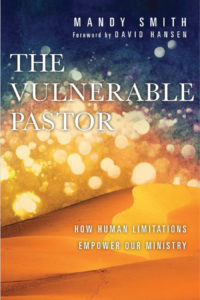The Vulnerable Pastor
How Human Limitations Empower Our Ministry
Mandy Smith
IVP, 209 pages
 Ministry was never part of my plan. Dance was my first love and I spent more than ten years training, performing, and teaching. When I moved to Los Angeles to pursue my bachelor’s degree in business, I was also taking acting classes. My plan was to be an actor where I could showcase my dancing skills. So I was shocked one day when I received an email assigning me as the teaching pastor for an upcoming Sunday at church. My desire was to glorify God on the big screen, not preaching behind a pulpit.
Ministry was never part of my plan. Dance was my first love and I spent more than ten years training, performing, and teaching. When I moved to Los Angeles to pursue my bachelor’s degree in business, I was also taking acting classes. My plan was to be an actor where I could showcase my dancing skills. So I was shocked one day when I received an email assigning me as the teaching pastor for an upcoming Sunday at church. My desire was to glorify God on the big screen, not preaching behind a pulpit.
I started to get more invitations to speak. I was asked to co-lead a course on racial reconciliation and join a leadership cohort through the Evangelical Covenant Church called 30 for 30.
This was not the life I envisioned for myself. I felt inadequate for this call. So the title of Mandy Smith’s book, The Vulnerable Pastor: How Human Limitations Empower Our Ministry, especially intrigued me.
Culture teaches us that our limitations are weaknesses that we need to improve to be successful. But Smith depicts vulnerability in ministry as a strength, a place to give God the primary place in the equation of ministerial competency. She explains that God chooses us not because we are perfect, but because we offer something different—humanity. As pastors and communicators, we often talk about how God used imperfect people in the Bible, yet we still feel a need to be perfect in our own lives and ministry context. Perfection may get you popularity, but impact and effectiveness come with being vulnerable and real.
Smith writes, “God chooses us in all our inadequacy so that when it’s all said and done, there’s no question whose power was at work.” The personal stories Smith shares are an invitation to lean in, and she offers countless examples of what leading with vulnerability looks like.
Instead of discussing work-life balance, Smith suggests we focus on abundant life. Stepping away from performance to take sabbath is countercultural. But she encourages us to let rest fall in the middle of our work—not in order to be more productive but because we are human beings. “When God released his people from slavery in Egypt, even before he gave the Ten Commandments, he gave them sabbath to break them out of the slave habit. Slaves don’t get a break,” says Smith. “But children do. Sabbath reminds us we are children of God.”
Reflection questions throughout each chapter challenged and encouraged me, and revealed truths I don’t think I’ve ever said out loud. I was able to process a particular personal church hurt. I knew in my mind the situation had upset me, but the reflection made me realize that deep down I was truly hurt and disappointed. It led to me to sit down with the individual involved and reconcile with them.
This book shifted my perspective. Instead of focusing on the areas where I saw lack—an introvert with no seminary or leadership experience—I now see an opportunity for God to work through me and for me to rely on him. My experiences give me a fresh perspective on how to do ministry. God is using my love for the arts to reach youth. I get to model the type of leader I wish I had seen early on in ministry. Whenever those thoughts of inadequacy threaten to resurface, I try to remind myself that God has called me to this and I’m trusting him to do what only he can do through me.
Whether you believe you are already vulnerable or you acknowledge you have room to grow, The Vulnerable Pastor will have an impact on how you lead and how you equip others to lead. Being vulnerable gives grace to others to do the same while breaking a culture of shame, perfection, and performance.
In Smith’s words, “We are astounded by the beauty of what we hold in our hearts, no less than the glory of God waiting to be expressed through human frailty.”













